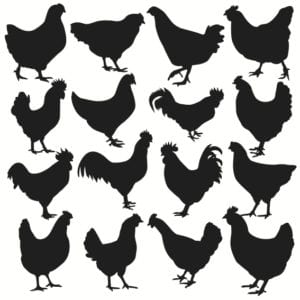
Before we turn the calendar pages to a new month, we would like to pause for a moment to honor September as National Chicken Month. With over 25 billion chickens in the world, they outnumber any other species of bird and are one of the few living creatures that can trace their ancestry to the Tyrannosaurus Rex. Here are some amazing facts about our feathered friends:
- Most of us know that chickens can’t fly; however they can travel up to nine miles an hour! The longest recorded distance flown by a chicken was 301.5 feet and the longest flight was thirteen seconds.
- Chickens are highly inquisitive and are considered by many to be as smart as dogs and cats.
- Chickens have an extremely diverse set of calls they use to communicate with each other. The dominant male will make a sound similar to “took, took, took” when he finds food. If a predator is approaching, a different call is used, telling the other birds not only what type of predator it is but whether it is flying, walking, or hiding.
- The color of a chicken’s earlobe often determines what color their eggs will be. Rhode Island Reds lay reddish brown eggs while Ameraucanas lay eggs with a greenish-blue hue. Colored eggs take on their tinge during the last five hours of shell formation.
- The hen’s diet dictates what color her yolks will be. The carotenoids found in corn or grass make her yolks yellow; if she eats more red peppers and naturally red fruits and vegetables, her yolks will be more golden.
- A hen lays between 280 to 300 eggs a year!
- To produce a dozen eggs, a hen must eat about four pounds of food. As omnivores, chickens love to eat bugs and seeds as well as mice and lizards. They can taste salt but can’t detect sweetness in their food.
- Chickens are extremely playful. They love to run, jump, and spar as well as watch television and listen to music. They often have individual preferences about the style of music and types of shows they enjoy too.
- In addition to be playful, chickens are empathetic. A mother hen will cluck to her chicks within their shells and they will chirp back to her. Once they are born, hens spread their wings over their chicks to protect them from weather and nearby predators.
- Chickens have an incredible memory! They can remember and recognize more than 100 other chickens and can even learn from others examples. If you want a chicken to lay an egg in a certain location, placing an egg in the designated location can encourage others to follow suit. However, if you have one chicken who displays bad habits (like eating eggs) they should be removed from the flock. Their tendency to mimic behavior could be detrimental.
- Chicken waste is some of the best fertilizer available. Not only that, the waste produced by one chicken could supply enough electricity to run a 100-watt light bulb for five straight hours.
We hope that these facts have given you a newfound appreciation for chickens. If you’d like to learn more about these fascinating creatures, we encourage you to check out the following resources:
http://www.backyardchickens.com/

